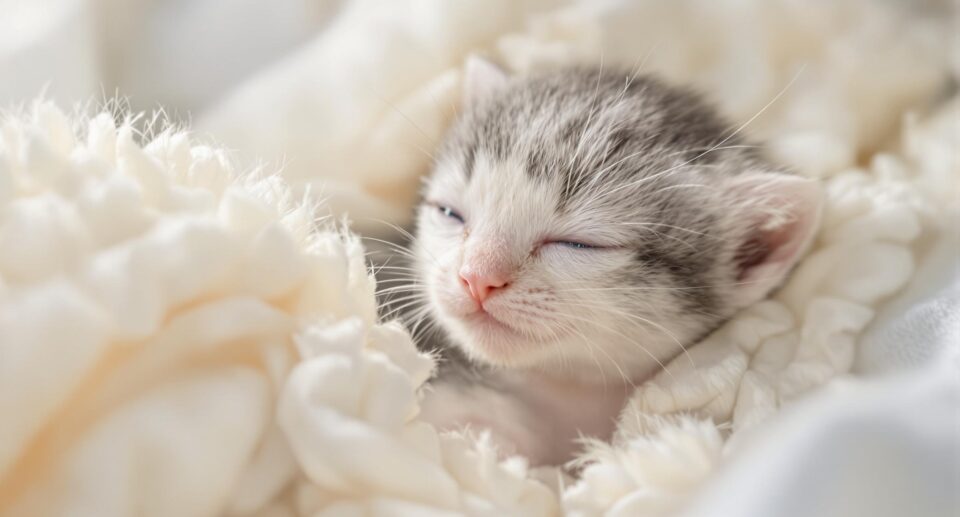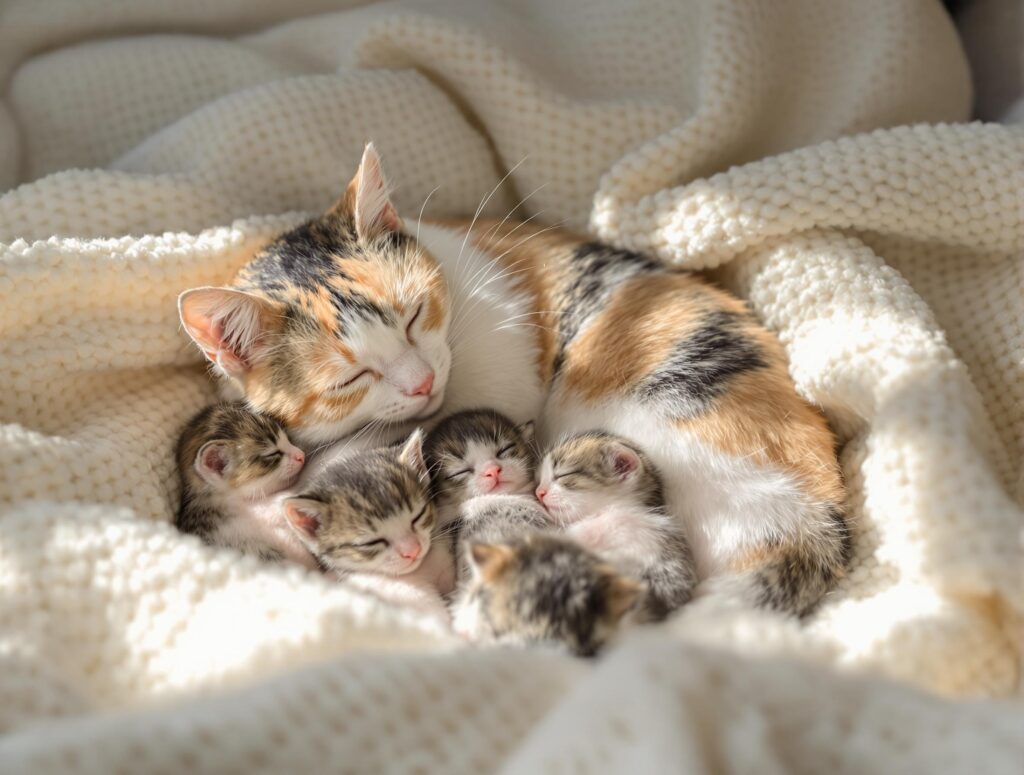What Do Newborn Cats Eat? Essential Nutrition Tips

Key Takeaways
- Newborn kittens rely on their mother’s milk or a vet-approved milk replacer to support their rapid growth and immune health.
- A consistent feeding schedule, along with tracking weight and appetite, ensures healthy kitten development.
- Providing proper nutrition in the early weeks sets the foundation for a happy, thriving cat.
Caring for newborn kittens is both exciting and delicate, especially when it comes to their nutrition. During their first weeks of life, kittens grow at an incredible rate and rely on proper feeding to support their development. Whether they’re nursing from their mother or require specialized care, their diet plays a crucial role in building a strong foundation for a healthy future.
Understanding how to meet a kitten’s needs can feel overwhelming, but with the right guidance, you can ensure they get off to the best start. If you’re unsure where to begin, your veterinarian can help you choose the best feeding approach based on your kitten’s condition and development. At PetHealthMD, we’re here to help you navigate every stage of their feeding journey—whether you’re supporting a nursing mother or caring for an orphaned kitten. Let’s explore the essential feeding practices that help newborn kittens grow into thriving, happy cats.
The Natural Diet of Newborn Kittens
Newborn kittens rely on their mother’s milk to grow strong and healthy. Their nutritional needs change as they develop, so here’s a breakdown of what they eat at each stage:
Birth to 48 Hours
Colostrum is the first milk a mother cat produces, packed with antibodies and nutrients that help protect newborn kittens from illness. Kittens can only absorb these benefits in the first 48 hours, making early nursing essential for a strong start.
1–3 Weeks
Kittens nurse every two to four hours, getting essential nutrients from their mother’s milk. This stage is all about rapid growth, with kittens doubling in size within the first week. Their mother’s milk naturally adjusts to meet their changing needs.
3–4 Weeks
Kittens start exploring soft, wet kitten food while continuing to nurse. Their digestive system is still developing, so they need easy-to-digest meals. Some may need encouragement to transition to solid foods.
4–8 Weeks
Mother’s milk becomes less of their diet as kittens eat more wet food and begin trying dry food too. By eight weeks, they are typically fully weaned and ready for a balanced kitten diet.
Each stage of a kitten’s growth requires the right nutrition to support their development. Whether nursing from their mother or receiving bottle-fed care, their diet lays the foundation for a healthy future. If you’re caring for a newborn kitten, consult a vet to ensure they’re getting everything they need to thrive. Explore cat food and nutrition products at 1800PetMeds to support every stage of growth.

Creating a Feeding Schedule for Newborn Kittens
Your tiny new kitten needs nourishment every few hours to grow into a healthy cat. Newborn kittens thrive on a consistent feeding pattern throughout the day. For the first weeks of life, offer bottle feedings every 2–4 hours. Many caring pet parents find that setting gentle phone reminders helps maintain this nurturing rhythm.
Your pet will show clear signs when feeding time is just right. A properly nourished kitten displays a gently rounded tummy, rests peacefully between meals, and shows steady weight gain.
Document your kitten’s journey with a simple feeding diary. Note the time and amount of each meal, daily weight in ounces, and observations about energy levels or appetite changes. This loving attention to detail helps track growth milestones and spot potential concerns early.
As your kitten grows, their diet evolves from frequent, smaller meals to a more consistent feeding schedule. You’ll incorporate new types of food, like dry kibble, to meet their nutritional needs. Keeping track of these changes ensures that your pet receives the right balance of nutrients at every stage of development.
Finding the Best Milk Replacement for Kittens
Choosing the right milk replacement for your kitten can feel overwhelming. As a pet parent, you want to provide the best nutrition possible when a mother’s milk isn’t available. Let’s explore the most reliable options to help your little one thrive.
Trust veterinary-approved commercial formulas like KMR (Kitten Milk Replacer), which nurtures kittens through their first six weeks of life. This gentle formula provides about two tablespoons of nutrition per 4 ounces of body weight daily.
Look for milk replacers that contain easily digestible proteins, healthy fats, and essential vitamins. Mix formula with care—warm water (never hot) and gentle stirring create the perfect blend. Test the temperature on your wrist just like you would for a baby’s bottle—it should feel comfortably warm, not hot.
Mixed formula can be kept fresh in the refrigerator for up to 24 hours. Always bring it to room temperature before feeding. Clean bottles and mixing tools thoroughly between uses.
Watch for happy feeding signs: steady weight gain, bright eyes, and playful energy. If your kitten seems uncomfortable or refuses food, consult your veterinarian right away.
While emergency homemade formulas might seem tempting, they lack proper nutrients for healthy development. Always keep commercial formula on hand for your kitten’s safety.
Foster Healthy Development Through Proper Nutrition
Providing proper nutrition during the early weeks of a kitten’s life sets the stage for lifelong health and well-being. Every feeding is an opportunity to nurture their growth, establish good habits, and strengthen their bond with you. As they transition through different stages of development, staying attentive to their needs helps ensure a smooth and healthy journey into adulthood.
At PetHealthMD, we’re here to support you with nutrition guides, feeding schedules, and practical advice tailored to growing kittens. Whether you have questions about portion sizes, feeding techniques, or dietary concerns, we’re here to help. Explore our cat supplies and essentials today and give your kitten the best possible start in life.
Frequently Asked Questions About Feeding Newborn Kittens
What can I feed a newborn kitten if I don’t have formula?
If kitten formula is unavailable, consult your vet immediately for safe alternatives. Avoid cow’s milk, as it can cause digestive upset.
When should I start weaning my kitten from milk?
Weaning usually begins around 3–4 weeks of age when kittens start licking soft food. Gradually mix wet food with formula until they transition fully.
How do I know if my kitten is getting enough to eat?
Healthy kittens gain weight daily, have rounded bellies, and sleep soundly after feeding. Track weight regularly to ensure steady growth.
Can I feed my kitten dry food right away?
No. Start with milk or milk replacer, then introduce wet kitten food around 3–4 weeks before offering dry kibble.
How can I keep my kitten’s feeding supplies clean?
Wash bottles, nipples, and mixing utensils with warm, soapy water after every feeding to prevent bacteria buildup.





